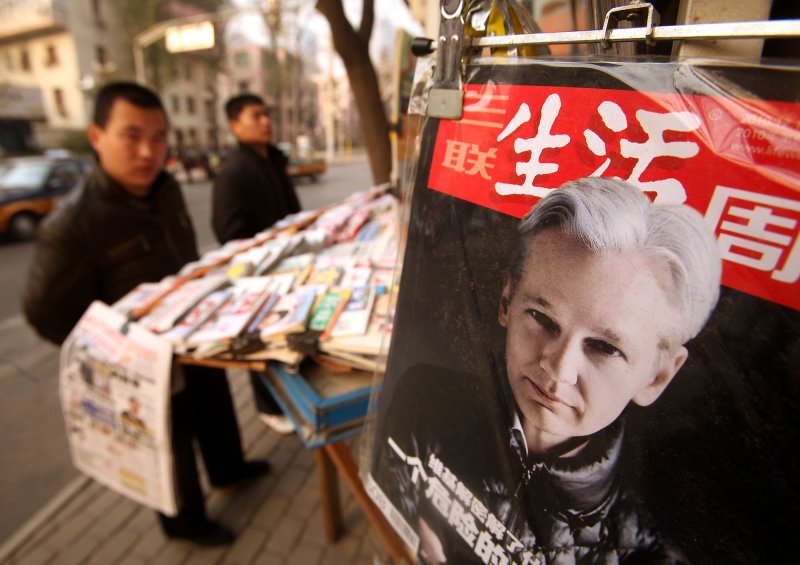A Chinese magazine featuring a front-page story on embattled Wikileaks' founder Julian Assange goes on sale at a news stand in Beijing December 9, 2010. China has blocked internet access to Wikileaks' release of more than 250,000 and counting U.S. Department of State cables, with its Foreign Ministry saying that it does not wish to see any disturbances in China-U.S. relations. UPI/Stephen Shaver |
License Photo
LONDON, Dec. 9 (UPI) -- As Julian Assange, the controversial founder of WikiLeaks, sits in a London jail cell facing extradition to Sweden on sex charges, U.S. officials are demanding he be tried in the United States for the release of thousands of diplomatic cables.
His supporters see in Assange, 39, a beacon of free speech and a man who stands against injustice; his critics say he's putting lives at risk by leaking information that should remain classified.
In the United States, the outcry against the man from Australia is becoming louder and more vicious by the day. Mitch McConnell, R-Ky., the Republican leader in the U.S. Senate, has called Assange a "high-tech terrorist" for disseminating thousands of classified diplomatic cables, some of which contain embarrassing assessments from U.S. diplomats around the world.
"He has done enormous damage to our country and I think he needs to be prosecuted to the fullest extent of the law. And if that becomes a problem, we need to change the law," McConnell said Sunday on NBC's "Meet the Press."
Sen. Dianne Feinstein, D-Calif., has called for Assange to be charged under the U.S. Espionage Act of 1917, a strategy that U.S. Attorney General Eric Holder said he would look into. While U.S. President Barack Obama has been silent on Assange's case, U.S. State Department spokesman Philip Crowley called WikiLeaks' actions "a crime under U.S. law."
Washington's determination to prosecute Assange is reminiscent of the one it developed in the case against former Beatle John Lennon.
At the height of Lennon's opposition to the war in Vietnam, he faced repeated attempts by the U.S. government under President Richard Nixon to silence him. With anti-war demonstrations gathering steam in the country, Lennon was deemed a threat to national security. U.S. investigators, combing through the legal system for ways to send him back to Britain, turned up an old marijuana conviction to launch a deportation case. It lasted for years, but Lennon eventually won it.
History might repeat itself. Legal experts say U.S. authorities have at best a weak case against Assange. In their bid to charge him for publishing secret documents, U.S. authorities face a major obstacle: The First Amendment.
While it's possible to prosecute government-linked people who steal the documents in the first place -- Assange's sources in the government and the military -- it's hard if not impossible to criminalize those who publish them.
In 1971, the Nixon administration tried to stop The New York Times and Washington Post from printing stories based on a highly classified account of the Vietnam War. The Supreme Court ruled in favor of the newspapers.
While Sen. Joe Lieberman, I-Conn., this week urged the Justice Department to launch a "very intensive inquiry" against The New York Times to find out whether the paper had committed a crime by publishing reports based on the WikiLeaks cables, legal experts say there is little chance that a news organization can be criminalized in light of the 1971 ruling.
As for WikiLeaks: Under the Espionage Act, prosecutors would have to prove that Assange was aware that publication of the documents would damage national security, or show he was complicit in stealing the cables from the government.
"Leaks of classified information to the press have only rarely been punished as crimes, and we are aware of no case in which a publisher of information obtained through unauthorized disclosure by a government employee has been prosecuted for publishing it," Jennifer Elsea, a legal researcher for the U.S. Congress, wrote in a report obtained by the BBC.
Right now, Assange is far away from the reach of U.S. authorities. But his lawyer says he's concerned that, if extradited to Sweden, a trip to the United States might be next.





